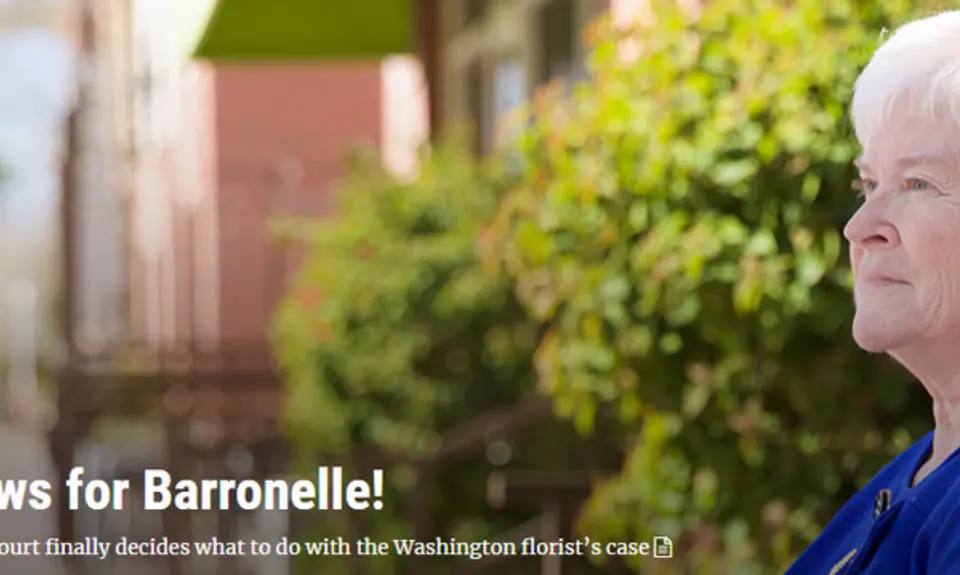Religious Right legal group Alliance Defending Freedom celebrated today’s action by the U.S. Supreme Court telling the Washington state supreme court to reconsider a case involving a florist who ran afoul of the state’s nondiscrimination law when she refused to make arrangements for a same-sex couple’s wedding. The state supreme court had upheld a lower court’s ruling against the florist, but the U.S. Supreme Court directed that state court to reconsider the case in the light of its recent ruling in favor of a Colorado baker.
In Masterpiece, the Colorado case, the Supreme Court did not fully grapple with the tensions between the state’s interest in protecting people against discrimination and the religious freedom and free speech claims of the baker. The Supreme Court found instead that some Colorado officials had impermissibly expressed hostility toward the baker’s religious beliefs.
In a fundraising pitch rushed out after today’s move, ADF praised God for its recent victories:
We must stand together as opponents of religious freedom continue to try to punish Christians for their faith. And your support today could help turn the tide for Barronelle.
There were many who did not think Jack would win—they didn’t believe there was hope. That just shows you how powerful God is, and what a difference your prayers and financial gifts can make.
After the Colorado ruling, ADF quickly moved to assert that Washington’s courts and attorney general has demonstrated unacceptable hostility toward the florist’s religious views. The state of Washington filed a supplemental brief in response. “None of [ADF’s] examples can bear the slightest scrutiny,” said the state’s brief. “In short, very little in Petitioner’s supplemental brief is accurate, and nothing in it should affect this Court’s disposition of this petition.”
ADF has made a major investment in turning Colorado baker Jack Phillips and Washington florist Baronnelle Stutzman into a folk heroes among religious conservatives and soft-spoken ambassadors for the weaponized version of religious liberty that ADF promotes. Stutzman repeated her talking points on a conference call with media on Monday afternoon.
On the same call, Stutzman’s ADF attorney, Kristen Waggoner, argued that Washington’s attorney general has “punitively and relentlessly” pursued her. Waggoner said the same attorney general did not go after a Seattle coffee shop owner who Waggoner claimed threw Christians out of his shop for their religious beliefs. That incident was more complicated, of course; the shop’s gay co-owner was angered by the inflammatory anti-abortion materials being distributed by the group, which included a flyer in which rainbow-colored hands dripped blood onto an aborted fetus.
In response to a reporter’s question, Waggoner said that in the religious refusal cases they are currently pursuing in the courts, they have not asserted the principle that business owners should be able to refuse to deny service to people based on who they say they are. While that may be technically true about the arguments ADF has raised in these specific cases, it suggests a “live and let live” approach to LGBTQ people that is not reflected in ADF’s history and work.
As People For the American Way Senior Legislative Counsel Paul Gordon noted a few years ago about the Religious Right’s appeal for LGBTQ people to take a “live and let live” approach:
The “religious liberty” claim with its call to “live and let live” is believable only if it is completely divorced from context and history. It’s like a still photo, one split-second moment that is disconnected from either the past or the future.
But the history of the Religious Right provides vital context to their current claims. It is anything but a history of “live and let live” and respect for religious pluralism. Instead, it is a history of strident, uncompromising opposition to anything that diminishes the stigma of second-class citizenship for LGBT people, in situations having nothing to do with protecting anyone’s religious exercise rights.
On the call, Waggoner said that “tolerance is a two-way street,” but ADF’s notion of “tolerance” toward LGBTQ people has included defense of laws that criminalize homosexuality and gay people.
For example, ADF supported states’ criminal sodomy laws that made gay people de facto criminals and enabled harsh discrimination against them, and urged the Supreme Court not to overturn them, which it did in 2003 in Lawrence v. Texas. Since then, ADF has continued to criticize the Lawrence decision while actively defending other countries’ repressive laws criminalizing homosexuality. When the Supreme Court in India reversed an earlier ruling and re-imposed a colonial-era anti-sodomy law, the head of ADF’s international arm praised the court for doing “the right thing,” explicitly making a contrast to the U.S. Supreme Court ruling in Lawrence. ADF also actively promotes anti-transgender legislation and policies at state and school board levels.
ADF’s current president, Mike Farris, has his own track record. When equality activists organized against an Indiana law protecting anti-LGBTQ discrimination in the name of religious freedom, Farris warned against “political correctness with the regimentation and force that Nazi Germany would be proud of.”





